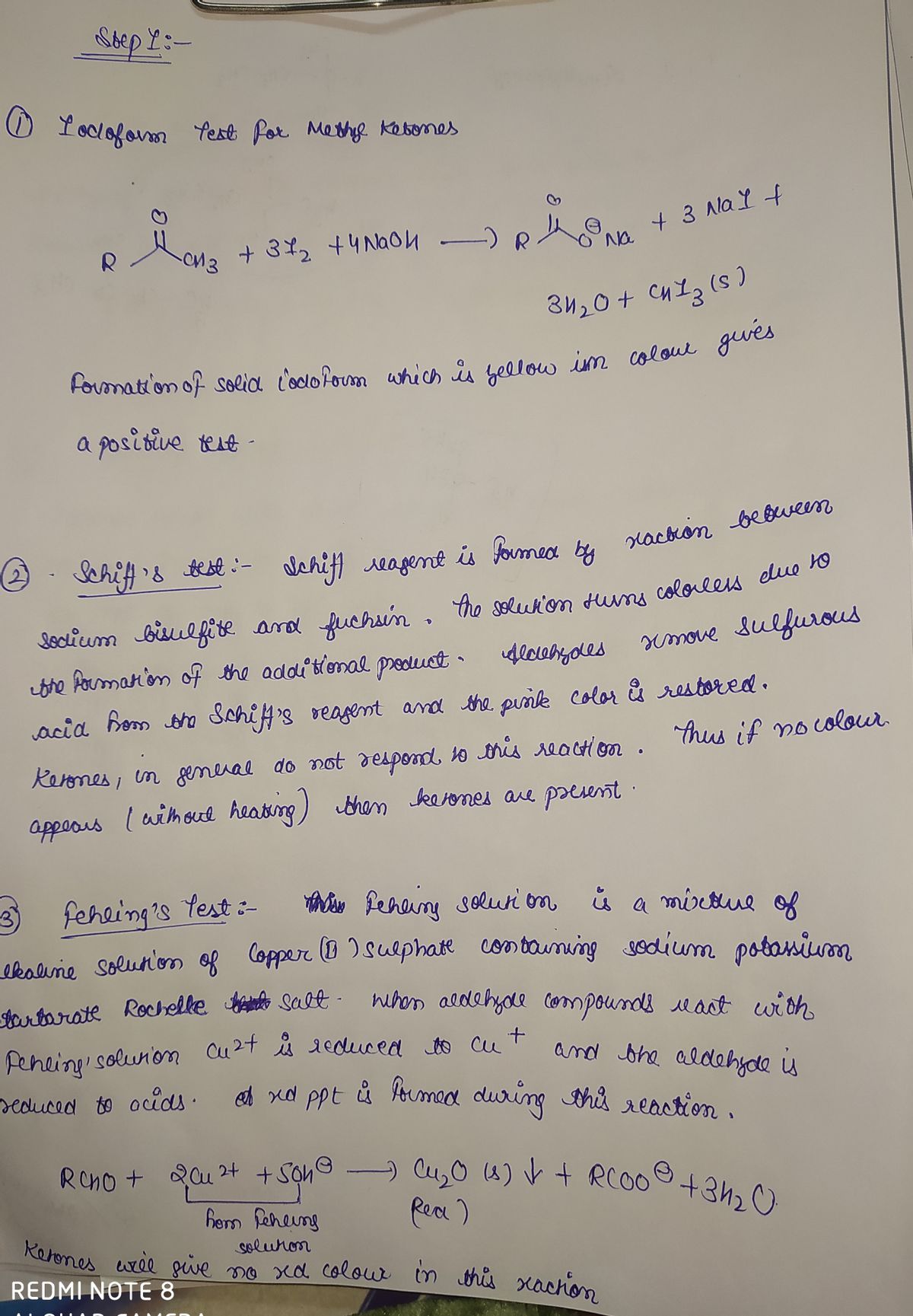Chemistry
10th Edition
ISBN:9781305957404
Author:Steven S. Zumdahl, Susan A. Zumdahl, Donald J. DeCoste
Publisher:Steven S. Zumdahl, Susan A. Zumdahl, Donald J. DeCoste
Chapter1: Chemical Foundations
Section: Chapter Questions
Problem 1RQ: Define and explain the differences between the following terms. a. law and theory b. theory and...
Related questions
Question
![**Title: Wet Chemical Tests for Ketones**
**Introduction:**
This section explores the various wet chemical tests that are specific to ketones. These tests are essential for distinguishing ketones from other functional groups in organic chemistry.
**Text Transcription:**
- "Give the wet chemical tests (#1-6) that work for KETONES only."
**Overview of Tests:**
1. **Test 1:** [Description of the test and expected results specific to ketones]
2. **Test 2:** [Description of the test and expected results specific to ketones]
3. **Test 3:** [Description of the test and expected results specific to ketones]
4. **Test 4:** [Description of the test and expected results specific to ketones]
5. **Test 5:** [Description of the test and expected results specific to ketones]
6. **Test 6:** [Description of the test and expected results specific to ketones]
**Conclusion:**
Understanding and performing these tests accurately allows chemists to effectively identify ketones in a mixture of organic compounds. Each test has unique identifiers that react exclusively with ketones, thereby confirming their presence.](/v2/_next/image?url=https%3A%2F%2Fcontent.bartleby.com%2Fqna-images%2Fquestion%2F251030ad-5f66-4881-a44c-6d7b6c50c736%2Feae15320-3f4e-4da9-b582-c790167100b4%2Fw1m35ln.jpeg&w=3840&q=75)
Transcribed Image Text:**Title: Wet Chemical Tests for Ketones**
**Introduction:**
This section explores the various wet chemical tests that are specific to ketones. These tests are essential for distinguishing ketones from other functional groups in organic chemistry.
**Text Transcription:**
- "Give the wet chemical tests (#1-6) that work for KETONES only."
**Overview of Tests:**
1. **Test 1:** [Description of the test and expected results specific to ketones]
2. **Test 2:** [Description of the test and expected results specific to ketones]
3. **Test 3:** [Description of the test and expected results specific to ketones]
4. **Test 4:** [Description of the test and expected results specific to ketones]
5. **Test 5:** [Description of the test and expected results specific to ketones]
6. **Test 6:** [Description of the test and expected results specific to ketones]
**Conclusion:**
Understanding and performing these tests accurately allows chemists to effectively identify ketones in a mixture of organic compounds. Each test has unique identifiers that react exclusively with ketones, thereby confirming their presence.
Expert Solution
Step 1

Step by step
Solved in 2 steps with 2 images

Recommended textbooks for you

Chemistry
Chemistry
ISBN:
9781305957404
Author:
Steven S. Zumdahl, Susan A. Zumdahl, Donald J. DeCoste
Publisher:
Cengage Learning

Chemistry
Chemistry
ISBN:
9781259911156
Author:
Raymond Chang Dr., Jason Overby Professor
Publisher:
McGraw-Hill Education

Principles of Instrumental Analysis
Chemistry
ISBN:
9781305577213
Author:
Douglas A. Skoog, F. James Holler, Stanley R. Crouch
Publisher:
Cengage Learning

Chemistry
Chemistry
ISBN:
9781305957404
Author:
Steven S. Zumdahl, Susan A. Zumdahl, Donald J. DeCoste
Publisher:
Cengage Learning

Chemistry
Chemistry
ISBN:
9781259911156
Author:
Raymond Chang Dr., Jason Overby Professor
Publisher:
McGraw-Hill Education

Principles of Instrumental Analysis
Chemistry
ISBN:
9781305577213
Author:
Douglas A. Skoog, F. James Holler, Stanley R. Crouch
Publisher:
Cengage Learning

Organic Chemistry
Chemistry
ISBN:
9780078021558
Author:
Janice Gorzynski Smith Dr.
Publisher:
McGraw-Hill Education

Chemistry: Principles and Reactions
Chemistry
ISBN:
9781305079373
Author:
William L. Masterton, Cecile N. Hurley
Publisher:
Cengage Learning

Elementary Principles of Chemical Processes, Bind…
Chemistry
ISBN:
9781118431221
Author:
Richard M. Felder, Ronald W. Rousseau, Lisa G. Bullard
Publisher:
WILEY